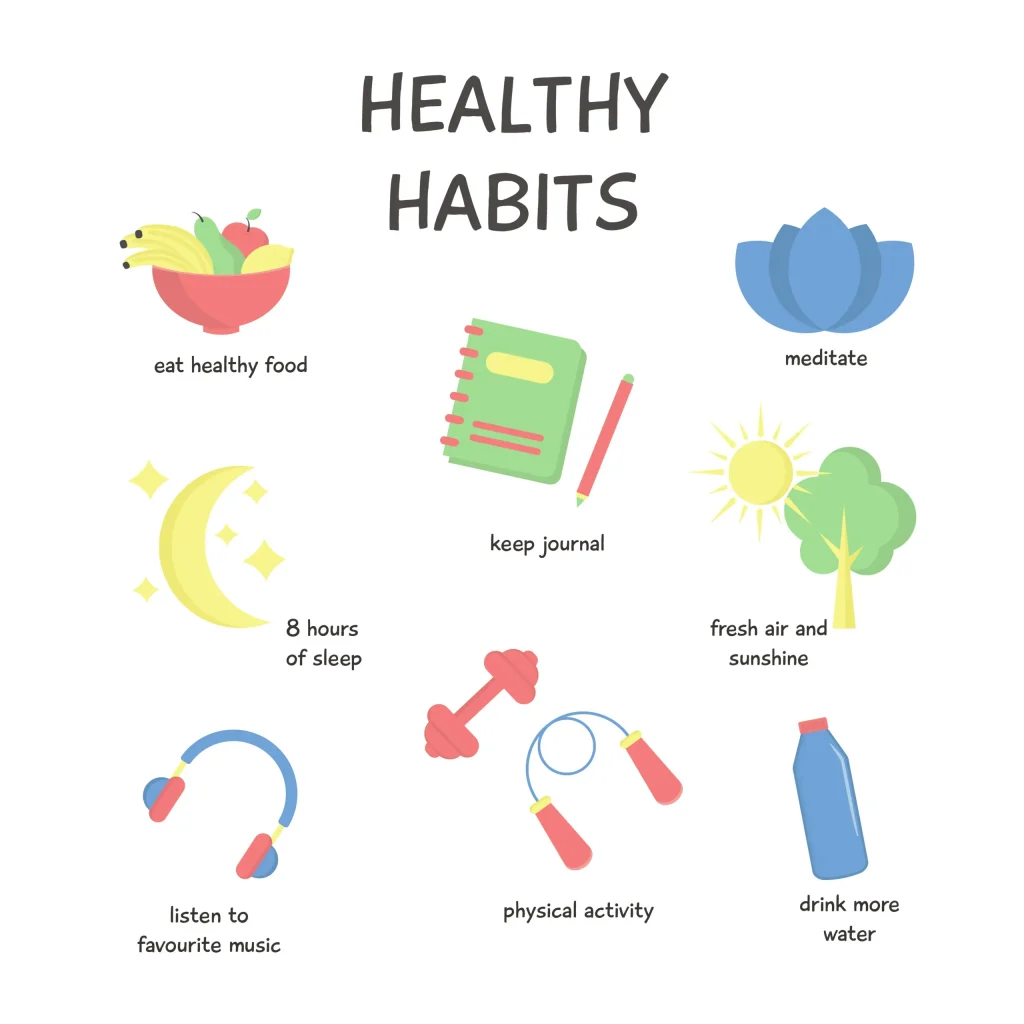Health habits shape daily life and long-term well-being. In a world of quick fixes, adopting small, sustainable actions can yield lasting results for health, energy, and peace of mind, even with a busy schedule. These habits for a healthier life focus on nourishment, movement, sleep, and mental well-being, and they fit into daily health routines. The goal is not perfection but consistency, building a routine that supports your unique needs and goals in a sustainable, flexible way. We’ll discuss how to implement each habit, how to track progress, and how to adjust as life changes, with practical steps and realistic timelines.
Viewed through a broader lens, health practices become everyday routines that nurture energy, mood, and resilience. Think in terms of wellbeing practices, lifestyle choices for balance, and routine self-care that reinforce nutrition, movement, rest, and social connection. By framing the topic with synonyms such as wellness routines, vitality habits, and preventive care, you can recognize the same goal from multiple angles. This approach helps readers connect related concepts and see practical steps that fit real-life schedules.
Health Habits That Transform Your Day: Simple Health Habits, Daily Health Routines, and Wellness Habits
Small, sustainable actions compound over time. By starting with simple health habits—such as a glass of water on waking, a quick morning stretch, and a nutrient-dense breakfast—you create a reliable foundation for daily health routines and overall wellness. This approach emphasizes consistency over perfection and fits real life while building resilience against stress and fatigue.
To turn these ideas into lasting change, pair new actions with existing routines, set gentle cues, and track progress with a simple habit tracker. Over days and weeks, Health habits accumulate into a healthier lifestyle, lifting energy, mood, and focus while remaining adaptable to shifting schedules.
Habits for a Healthier Life: Nourishment, Sleep, and Movement as Healthy Lifestyle Tips
Nutrition forms the backbone of healthy lifestyle tips. Emphasize plant-forward meals, vegetables, legumes, nuts, and fiber to fuel workouts, support digestion, and sustain steady energy. Pair this with hydration and mindful portions to create daily health routines that feel satisfying rather than restrictive.
Beyond food, sleep, movement, and time outdoors round out a holistic plan. Treat each habit as a thread in a larger tapestry: when you combine nourishment with rest and social connection, you reinforce each other and create a sustainable path toward a healthier life. These health habits, woven into daily life, become wellness habits and healthy lifestyle tips that last and deliver durable benefits.
Frequently Asked Questions
What are simple health habits I can start with to support daily health routines and habits for a healthier life?
Begin with a few foundational, simple health habits and weave them into your daily health routines. Start with hydration—a glass of water on waking and a refillable bottle for throughout the day—then add a 20–30 minute movement habit, like a brisk walk. Pair these with a consistent sleep-wind down and a brief mindful moment each morning. Track progress with a simple habit tracker or notes app, and adjust as life changes. The goal is steady consistency, not perfection, building toward healthier life goals through small, sustainable steps.
Which wellness habits from healthy lifestyle tips should I prioritize to boost energy and mood in my daily health routines?
Prioritize a few wellness habits that fit your life and support your daily health routines. Start with three non-negotiables: proper hydration, 7–9 hours of quality sleep, and daily movement (even brief but regular activity). Add social connection and moments of gratitude or reflection to support mental well-being. Use a simple plan and track progress to stay on course, then adjust as needed. Focusing on these healthy lifestyle tips creates lasting energy, better mood, and a resilient daily routine.
| Habit | Core Idea | Implementation Tip |
|---|---|---|
| Hydration first | Hydration supports metabolism, cognition, and physical performance. | Keep a water bottle handy and sip throughout the day. |
| Sleep is non-negotiable | Most adults need 7–9 hours; prioritize quality and routine. | Establish a wind-down routine, dim lighting, and a consistent bedtime. |
| Balanced meals, not perfection | Whole foods with vegetables, lean proteins, healthy fats, and fiber. | Aim for a satisfying plate, not perfection; plan meals for energy and digestion. |
| Move daily, in small ways | Daily movement builds consistency and compounding benefits. | Try a 20–30 minute walk, light home workout, or yoga. |
| Create mindful mornings | A few minutes for intention, gratitude, or gentle stretches. | Set a positive tone with a short routine before starting the day. |
| Sunlight and vitamin D | Safe sun exposure supports mood and immune health; consider vitamin D if needed. | Spend time outdoors or take a vitamin D option after a professional consult. |
| Screen time breaks | Reduce eye strain and stress by brief regular breaks. | Use 20–20-20 rule and stretch to reset posture. |
| Moderate caffeine and mindful timing | Caffeine supports alertness but timing matters. | Avoid late-afternoon caffeine to protect sleep quality. |
| Social connections matter | Strong relationships boost mood and reduce stress. | Nurture relationships, join groups, or check in with friends. |
| Gratitude and reflection | Gratitude or journaling supports mental health. | Practice daily gratitude or short journaling. |
| Hygiene and preventive care | Regular hygiene, dental care, and preventive screenings. | Keep up with vaccinations, checkups, and screenings. |
| Plant-forward meals and fiber | Vegetables, fruits, legumes, nuts, and whole grains. | Support workouts, memory, mood; plan plant-forward meals. |
| Processed foods in moderation | Reducing ultra-processed foods lowers inflammation and improves energy. | Shift gradually rather than eliminate favorites. |
| Regular health checkups | Routine visits and screenings catch issues early. | Schedule annual checkups and discuss preventive strategies. |
| Time in nature | Outdoor time reduces stress and boosts activity. | Park strolls, hikes, or nature outings for mood and health. |

